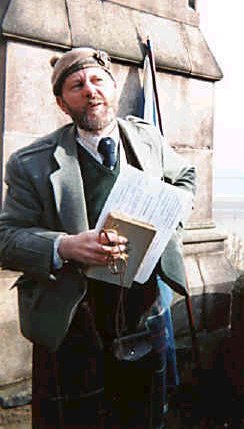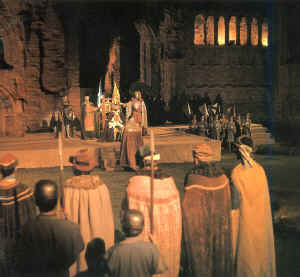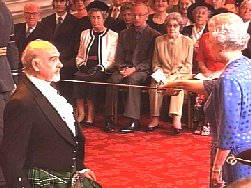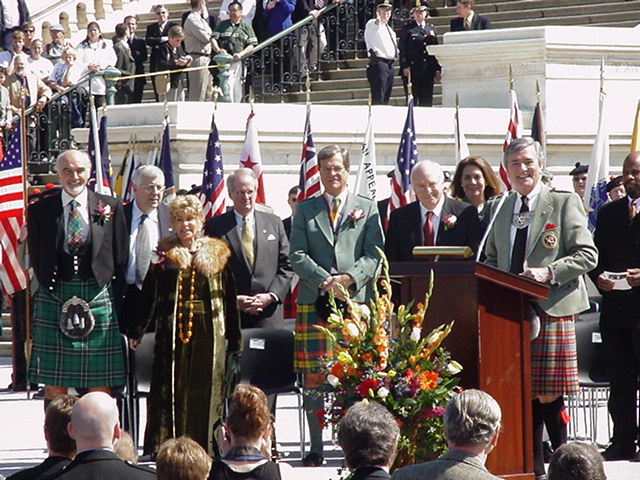|
This is
a Real Audio Production for U.S. Tartan Day
(Click the links below to
listen to our tribute and read it below) Our
Real Audio Production
Our Text & Real Audio
Production
 Introduction
by Peter D. Wright, Chairman of the Scots Independent... Introduction
by Peter D. Wright, Chairman of the Scots Independent...
Introduction by Peter
D Wright, Chairman of the Scots Independent
Welcome to the Scots Independent tribute to US Tartan day - 6th of April - and commemoration of the date when the Scottish Nobles appended their seals to a letter to Pope John
XXII at Arbroath Abbey requesting that he recognise Scottish Independence.
In any other country in the World dates such as 30 November, St Andrews Day (Scotland's Patron Saint); 23 June, Scotland's Day (as promoted by the National Party of Scotland, fore-runner of the modern Scottish National Party); and 6 April, Independence Day, would be marked with Public Holidays and National Celebrations - but not in
Scotland. So we are very grateful to our American Cousins for instigating 6 April as US Tartan Day in recognition of the
input by Scots to the development of the United States of America.
It is rather ironic that the present Scottish First Minister will be visiting the States for Tartan day when he, in common with his Unionist colleagues, would deny Scots at home the opportunity to participate in any celebration of dates which would remind Scots that until 1707 they were sovereign and free.
The Scottish letter from Arbroath to Pope John XXII marked Scotland's emergence as the first Nation State in Europe in modern terms. Scots in 1320 fully realised the need for Independence and with a devolved
Scottish Parliament sitting in Edinburgh once again, we are hopefully on the march towards regaining that full
Independence lost in 1707.
I hope that you enjoy this tribute in speech, music and song to US Tartan Day and The Declaration of
Arbroath.
Celebrating the Pipes
(by Gordon Duncan)
Extracts from the
Declaration of Arbroath read by Marilyn Wright
The
song "1320" by Gaberlunzie
Visit the SI's Tribute to Gaberlunzie
An Address by James Halliday for US Tartan
Day, 6th April 2001
An address by James
Halliday for US Tartan Day 2001
(Historian and author, former National Chairman of the Scottish
National Party
and Lecturer on American History)
Have a read of James
Halliday's book "Scotland, the Concise History"
 If, as we hope and believe, Scots some day
can choose the day of their independence, they would perhaps choose
April 6th, and enjoy the final attainment of the independence asserted
on that date in 1320. The struggle goes on; and in many parts of our
country people will be marking the day with ceremonies of their choice.
Probably our favourite passage from the Arbroath Declaration is the
great statement of commitment... If, as we hope and believe, Scots some day
can choose the day of their independence, they would perhaps choose
April 6th, and enjoy the final attainment of the independence asserted
on that date in 1320. The struggle goes on; and in many parts of our
country people will be marking the day with ceremonies of their choice.
Probably our favourite passage from the Arbroath Declaration is the
great statement of commitment...
As long as but a hundred of us remain
alive, never will we on any conditions be brought under English rule. It
is in truth not for glory, nor riches, nor honours that we are fighting,
but for freedom - for that alone which no honest man gives up but with
life itself.
A very personal, and specifically
Scottish declaration. A not
too dissimilar sentiment made by George Washington at Valley Forge some
centuries later..."If all else
fails, I will retreat up the valley of Virginia, plant my flag on the Blue
Ridge, rally around the Scotch-Irish of that region and make my last stand
for liberty amongst a people who will never submit to British tyranny
whilst there is a man left to draw a trigger."
But on this coming April 6th we will be reminded
that the Declaration was not for Scots alone. It invited the Pope and,
through him, Christendom, to listen and respond to Scotland's plea; and
it set out the reasons why Scots felt entitled to make these overtures. Edward
I of England had come "in the
guise of a friend and ally, to harass them as an enemy.
The deeds of cruelty, massacre, violence, pillage, arson,
imprisoning prelates, burning down monasteries, robbing and
killing monks and nuns, and yet other outrages without number" As
years and centuries passed, many other people had shared in these
experiences which went with invasion and denial of liberty. For instance,
by July 4th 1776, representatives of the Thirteen United States of America
were asserting that"The history
of the present King of Great Britain is a history of
repeated injuries and usurpations, all having in direct object the
establishment of an absolute tyranny over these states". And
George III's misdeeds were then listed and were, as we would say today,
"on the record". It was, of
course, one side of the record; "propaganda", if you like, but
propaganda is not necessarily untrue or unjust. The Arbroath Declaration
has commonly been dismissed as "propaganda" by those Scots -
those many Scots - who are angered and embarrassed by any claim to
independence made by their more free-minded fellows. But it was more than
that. It stood as a kind of example which might be used by others aspiring
to freedom. It asserted nationalist principles; and used national
terminology much earlier than national awareness had revealed itself
elsewhere, and earlier than many modern writers have been prepared to
admit. More than that, it offered to future generations a constitutional
principle which could merit support - regardless of nationality. Any
people disappointed in their ruler might justly"exert
ourselves to drive him out... and make some other man... our king" In
their own subsequent history Scots were quite often to act - or try to act
- in accordance with that principle, but through time the principle was
taken up and refined by others. The liberal strands in English political
thinking are commonly traced back to the writings of such as John Locke and
the martyred Algernon Sydney, and from England such ideas were spread. We
don't often find English scholars crediting Scottish sources, and some
Scottish political thinkers were expressing, in the late 1600s, ideas which
English observers assume must have come from Locke. Not necessarily.
They may have come without intermediaries from Bernard de Linton's text. We
don't know if Thomas Jefferson ever read the Declaration of Arbroath (though
with Jefferson, you never know). But he had read Locke. Furthermore, he had
read writings by Lord Kames, the Scottish jurist, and Kames must have been
familiar with the words of 1320. Mere coincidence, perhaps; but when
Jefferson produced his final draft of the American Declaration of
Independence he arranged his text in an order very similar to that of the
Scottish Declaration four and a half centuries earlier. It
was not just the Pope who had to be persuaded this time but"a
decent respect to the opinions of mankind requires that they
should declare the causes which impel them. Governments are
instituted among men, deriving their just powers from the
consent of the governed. Whenever any form of government
becomes destructive of these ends, it is the right of the people to
alter or to abolish it." The
caution presented to Bruce has been amplified, and given a verbal nobility,
but the message is the same. Political freedom means that all government must be
by the consent of the governed.
Scots have not been generous in marking
historical occasions. They have been too easily embarrassed by all those whose
mission has been to foster feelings of inferiority. But across the ocean the
leaders of the most powerful and influential country in the world have set aside
April 6th as a day to honour Scotland and Scottish contributions to the world's
betterment. Let us, with becoming modesty of course, accept and enjoy the
friendly gesture; and let us look ahead in fraternity to the anniversary of that
other Declaration on July 4th. One democratic
path runs from Arbroath via Philadephia to Gettysburg and onward to achieve
government of the people by the people for the people. Thank you, ladies and
gentlemen, for the kind thought of Tartan Day, and for perhaps appreciating that
our forebears stepped out on the same path as that trodden by the pioneers of
American freedom. More
celebration of the Pipes
(by Gordon Duncan) Extracts from the
American Declaration of Independence read by Marilyn Wright
Tartan
Day and The Declarations
Tartan Day
and the Declarations
 IN THE SENATE OF THE UNITED STATES
November 10, 1997 Mr. Lott submitted the following resolution; which was
referred to the Committee on the Judiciary. IN THE SENATE OF THE UNITED STATES
November 10, 1997 Mr. Lott submitted the following resolution; which was
referred to the Committee on the Judiciary.
RESOLUTION Designating April 6 of each year as
"National Tartan Day'' to recognize the outstanding achievements and
contributions made by Scottish Americans to the United States.
Whereas April 6 has a special significance for all
Americans, and especially those Americans of Scottish descent, because the Declaration
of Arbroath, the Scottish Declaration of Independence, was signed on April
6, 1320 and the American
Declaration of Independence was modeled on that inspirational document;
Whereas this resolution honors the major role that
Scottish Americans played in the founding of this Nation, such as the fact that
almost half of the signers of the Declaration of Independence were of Scottish
descent, the Governors in 9 of the original 13 States were of Scottish ancestry,
Scottish Americans successfully helped shape this country in its formative years
and guided this Nation through its most troubled times;
Whereas this resolution recognizes the monumental
achievements and invaluable contributions made by Scottish Americans that have
led to America's preeminence in the fields of science, technology, medicine,
government, politics, economics, architecture, literature, media, and visual and
performing arts;
Whereas this resolution commends the more than 200
organizations throughout the United States that honor Scottish heritage,
tradition, and culture, representing the hundreds of thousands of Americans of
Scottish descent, residing in every State, who already have made the observance
of Tartan Day on April 6 a success; and
Whereas these numerous individuals, clans,
societies, clubs, and fraternal organizations do not let the great contributions
of the Scottish people go unnoticed:
Now, therefore, be it Resolved, That the Senate
designates April 6 of each year as ``National Tartan Day''.
SIR SEAN
CONNERY

The Scots Independent Newspaper is delighted
that Sir Sean Connery will receive the Wallace Award on Tartan Day, 6th April
2001. We are pleased that Sir Sean is being so honoured as only the second
person to receive the Award; last year the award was given to Trent Lott, the
Republican Senate Majority Leader.
Sir Sean, or Big Tam, as he is affectionately
known in his native Scotland, is a long time supporter of Scottish
Independence and the Scottish National Party. His first public association
with the Party was during the Hamilton By Election in November 1967, when he
did a voice over for a Party Political Broadcast. Winnie Ewing won what had
been a safe Labour seat.
As plain Sean Connery, he actively campaigned
for a Yes vote in the 1997 Referendum , which delivered the first Scottish
Parliament for 300 years; he was present at the opening of that Parliament, to
hear the words "The Scottish Parliament , adjourned on 25th March 1707,
is hereby reconvened." spoken by Dr Winnie Ewing, Member of the Scottish
Parliament.
Sir Sean was knighted by the Queen in July
2000, an honour long overdue.
Scots Wha Hae Wi'
Wallace Bled
The song "Scots
Wha Hae" by Gaberlunzie
Scots, wha hae wi' Wallace bled
Scots, wham Bruce has aften led
Welcome to your gory bed
Or to victory!
Now's the day an' now's the hour
See the front of battle lour
See approach proud Edward's pow'r
Chains and slavery!
Wha would be a traitor knave?
Wha would fill a coward's grave?
Wha sae base as be a slave?
Let him turn and flee!
Wha for Scotland's king an' law
Freedom's sword would strongly draw
Freeman stand and freeman fa'
Let him on wi' me!
By oppression's woes and pains
By your sons in servile chains
We will drain our dearest veins
But they shall be free.
Lay the proud userpers low!
Tyrants fall in ev'ry foe
Liberty's in every blow
Let us do or dee!
HAVE A BRAW
TARTAN DAY
If you'd like to monitor
Scotland's continued fight for Independence visit the
Flag in the Wind each Friday for up to date analysis
and comment.
We'd like to take this opportunity
to thank Greentrax and
Gordon Duncan for the pipe music and Gaberlunzie
for the songs
POSTSCRIPT
And as a postscript to the big day
here are two photographs kindly send in by a friend of the site taken on the big
day...

Ceremony where Sir Sean Connery was presented the
William Wallace Freedom Award.
Includes Trent Lott and VP Dick Cheney, along with a smiling Sir Sean

Sir Sean Connery
|

